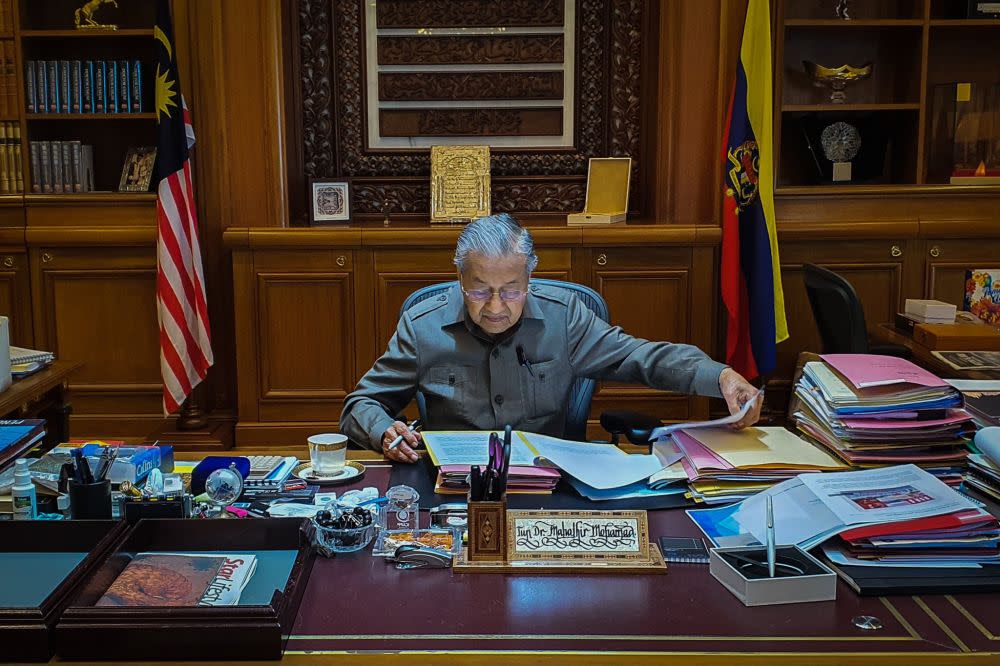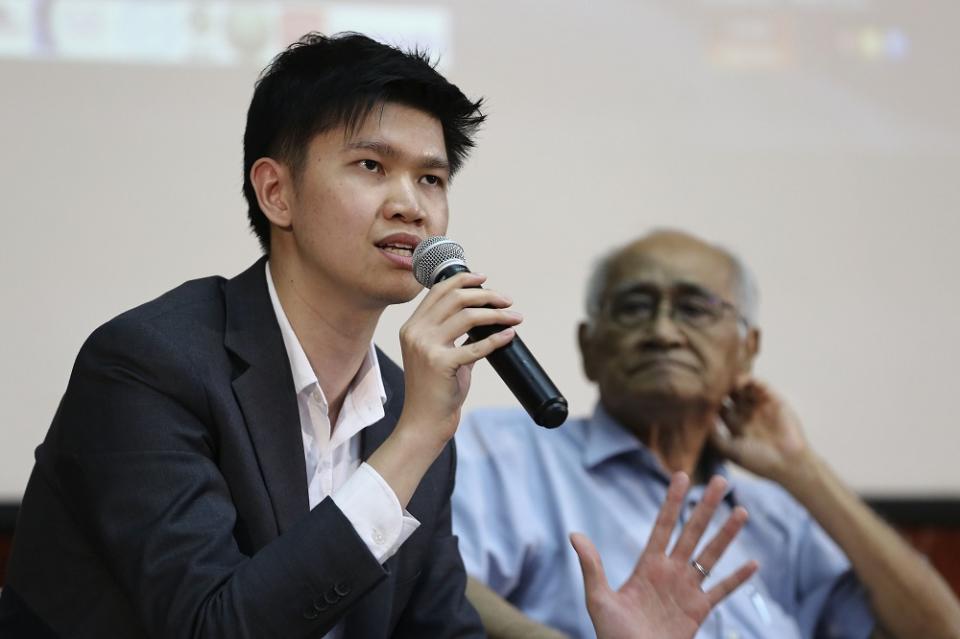Can interim PM announce Malaysia’s economic stimulus package amid Covid-19 outbreak? Lawyers weigh in

KUALA LUMPUR, Feb 26 — Tun Dr Mahathir Mohamad was pre-scheduled two weeks ago to announce an economic stimulus package tomorrow to tackle the economic effects of the Covid-19 virus outbreak, but the ongoing political crisis has now resulted in Dr Mahathir being the interim prime minister but with no other ministers in government.
The political crisis, triggered by a realignment of political loyalties and an alleged plot to engineer a backdoor government, caused the Pakatan Harapan coalition to cease having the parliamentary majority required to remain as government and also saw Dr Mahathir quitting as prime minister and dissolving Cabinet as interim prime minister.
DAP secretary-general Lim Guan Eng yesterday said that both he and the Finance Ministry had on Sunday (February 23) — which was the last day of his role as finance minister—finalised the economic stimulus package to be presented to the prime minister on Monday (February 24).
Following Dr Mahathir’s February 24 resignation as prime minister and appointment as interim prime minister, Lim said he had yesterday (February 25) discussed the matter of the economic stimulus package with him and added that Dr Mahathir said he would announce the package as interim prime minister at a later date.
Earlier today, Dr Mahathir’s official Twitter account in a tweet noted that he had met with senior Finance Ministry officials regarding the economic stimulus package and that this initiative would be announced soon.
The tweet did not say who would be announcing the economic stimulus package.

Can Dr M announce the economic stimulus package?
“We have a caretaker prime minister, not exactly a caretaker Cabinet or government. We are entering uncharted waters insofar as I am concerned.
“Having said that, I believe the caretaker principles apply — the interim prime minister should not introduce or pass major policy changes until a new PM is appointed. He steadies the ship, he doesn’t chart a drastically new course,” constitutional lawyer Lim Wei Jiet told Malay Mail.
But when asked if Dr Mahathir could as the interim prime minister announce the economic stimulus package, Lim said such responses to pressing issues that the country is facing could be carried out.
“Arguably, if there is a pressing public issue that needs major government response (as in this case), it would be unreasonable to expect the Interim PM to not do anything.
“Imagine there is a major security threat happening, I don’t think a caretaker government should be hamstrung from responding with policy even if it’s a major one.
“The point is that a caretaker government should only make major policies in reaction to something pressing, not proactively make major policies at its own whim,” the lawyer said.

Exercising PM’s functions as ‘interim’ PM
Constitutional lawyer Surendra Ananth said that Malaysia does not currently have a caretaker government in the conventional sense, which is typically when Parliament is dissolved and the previously-appointed ministers continue to carry out only the necessary functions of government until a new government is formed.
Surendra also noted that “caretaker” or “interim” are political terms and not legal terms, noting however that Dr Mahathir in his current role now would be able to do what a prime minister can do from a legal standpoint.
With Dr Mahathir serving as prime minister temporarily until a new successor is found, Surendra said it would be logical that he “takes care of ordinary and necessary business.”
“Interim government is not a legal concept. Since Tun got reappointed, legally he can do everything a PM can do including appoint ministers and advise the dissolution of Parliament,” he said.
“Now we have an ‘interim’ PM who can do anything a prime minister can do under the law, which includes introducing new policies. The Constitution does not recognise this concept of an interim PM. It’s either you are a PM or you are not,” he added, adding that Dr Mahathir can implement the economic stimulus package as he can in his current role introduce new policies.

Constitutional conventions and Cabinet manuals
Constitutional lawyer Nizam Bashir noted that a similar scenario to Dr Mahathir’s appointment as interim prime minister after his resignation was played out in Ireland recently, where Leo Varadkar resigned as prime minister but stayed on as interim leader while coalition talks are being conducted.
“In terms of powers, I take the view that the present situation is analogous to that of a caretaker government in that it is in place to maintain the status quo of the previous government and that major decisions such as major legislative changes ought not to be introduced.
“However, this does not mean an interim prime minister does not have the full powers of a prime minister. All that is required is compelling circumstances warranting a departure from those limitations,” he said, agreeing that this could include situations such as the announcing of the economic stimulus package depending on the justification for the departure from the need to merely maintain status quo.
With Malaysia’s current situation now analogous but not identical to a caretaker government, Nizam said that “by and large principles applicable to a caretaker government can inform us as to what can or cannot be done” but “the typical limitations may also not apply”, noting that the country still needs to be governed.
“I also think it’s time for Malaysia to have a Cabinet manual on matters like this. Most Commonwealth countries, like the UK and New Zealand, have such manuals,” he said, having also cited constitutional caretaker conventions applicable to Westminster-style constitutions as possible references for Malaysia.
Nizam cited the example in a 2011 Cabinet manual in the UK, which states that governments are expected by convention to observe discretion in starting any new action of a long-term nature in situations such as before an election or if the election results are unclear or after the loss of a vote of no confidence, but also states that “essential business must be allowed to continue” in all three situations.
A September 2019 guideline by the Canada government also provides for the caretaker convention where a government is to act with “restraint” during the election period or when Parliament is dissolved, which also explains that the government must continue its routine operation with necessary business carried out, with the government to also have a free hand during emergencies or natural disasters to take appropriate steps to ensure public interest is preserved.
The Canada guidelines, however, also state that government activity involving policy, spending and appointments should be limited to matters that are routine or non-controversial, or urgent and in the public interest, or that can be reversed by a new government without undue cost or disruption.
A local SOP version?
Back in 2013, electoral reforms group Bersih 2.0 published its broad guidelines for caretaker governments at the federal- or state-level when Parliament or state assemblies are dissolved and during the election period.
Among other things, Bersih 2.0’s guidelines stated that a caretaker government should not make major policy decisions that are likely to bind an incoming government, make significant appointments, enter into major contracts, announce any new financial grants or make new promises of infrastructure projects.
After the Pakatan Harapan coalition came into power in the May 2018 elections, the Election Reforms Committee (ERC) was set up to look into reforms of Malaysia’s elections.
The ERC chairman Tan Sri Ab Rashid Ab Rahman had previously pointed out that there were currently no laws or rules on how a caretaker government should function in Malaysia, and also noted the need for conventions to at least be put into written form as rules governing caretaker governments.
The ERC in January 2020 submitted to the prime minister an interim report with several recommendations including introducing standard operating procedures for a caretaker government, and was expected to prepare a full report to be submitted this August.
The Yang di-Pertuan Agong has been carrying out interviews with MPs since Tuesday in efforts to find a solution to Malaysia’s current political crisis, which requires a coalition or parties to have a simple majority or at least 112 out of the 222 MPs’ support to form government.
The political situation remains fluid and it is unknown how long Dr Mahathir will remain as interim prime minister, and whether a coalition with sufficient numbers to form a new government will emerge soon or if fresh elections would have to be called.
Related Articles Tokyo stocks end morning session down on Covid-19 worries Risk of power abuse, dictatorship tendencies: Pundits caution against unity govt idea Delta cutting flights to South Korea as JetBlue waives US change fees



